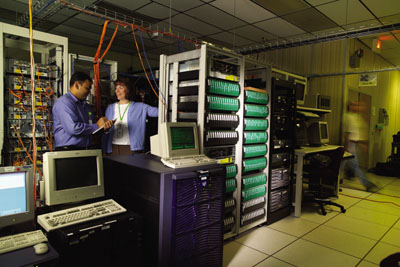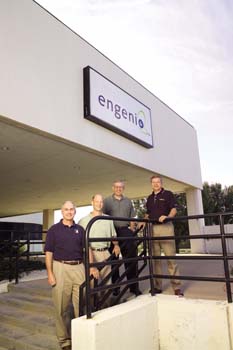
Khan ’04, software test technician.
The building at 37th and Rock Road, built in 1974, has worn many names.
For years it was NCR, at first making accounting computers the size of desks and later inventing the first SCSI (small computer system interface) chip — one prototype is on display in the Smithsonian.
The company was sold to AT&T in 1991 and called AT&T Global Information Solutions until its resale to Hyundai in 1995.
They dubbed it Symbios Logic and gave it a graceful logo of leaping dolphins. When LSI acquired it in 1998, they kept the "logic" in the name.
Now, as of May, the storage division of LSI Logic has become its own company, called Engenio. Whatever name may appear on the sign, the company has long stood on the front lines of computer technology. In fact, they're the largest high-tech firm in Kansas, with 600 employees. A tour of the plant's test lab reveals bank upon bank of sturdy metal housings each the size of a dresser, with green lights blinking in mysterious sequence. It looks like the future, but it's in Wichita now.
Engenio's test labs are not only full of blinking computers, but WSU engineering students as well, explains Stan Skelton '77, senior director of strategic planning. Their labor frees up senior engineers to develop the tests; workers can access test results 24/7 via cell phone or computer network. "It's a symbiotic relationship," says Skelton. "The WSU students get firsthand experience, and Engenio gets cost savings and a talent pool" of engineers.
The metal bureaus being tested are called "storage systems." To anyone outside computer technology, the phrase calls to mind closet organizers. Of course that's far from the truth. Skelton agrees that what Engenio strives for can be termed "massive redundancy."
Save one The Shocker article in Microsoft Word. It goes to one disk and stays there. If that disk breaks, physically or electronically, the data's gone forever. An Engenio subsystem, on the other hand, contains hundreds of drives over which data is spread, say, one letter from the Shocker article on each.
Each drive, and the power supplies that fuel the whole unit, are independent and replaceable, and not only does one drive's breakdown not affect the data in the rest of the system, the system is equipped with logarithms which can actually recreate the missing parts based on the data it still has. For really important data, each system can be backed up remotely to another system, creating even more redundancy and hence more storage security.
What's a Petabyte?
Ron Engelbrecht '81, vice president and general manager, is responsible for 700 employees worldwide in this role, overseeing manufacturing operations and engineering development activities. He's been with the company since the NCR days.
At that time, he says, 10 megabytes of storage were the size of a dishwasher, and each MB cost $3,000. Now, 100 MB go for about a penny and a 300 GB (300,000 MB) drive measures three and a half inches.
A 19-inch rack of drives stores 100 terrabytes (100,000,000 MB). And it doesn't stop there. Current orders call for multiple petabytes of storage. A petabyte, Engelbrecht explains, is a million gigabytes, a billion megabytes, a trillion kilobytes. A practical example: one petabyte could store this article, saved in Microsoft Word, 31 billion times.
Who needs that much storage? The U.S. government, for one, says Engelbrecht. Homeland security concerns make it necessary for government agencies to analyze complex systems such as travel patterns, voice transactions and fingerprint databases. Some government agencies use Engenio hardware to carry out these vital intelligence tasks.
Other end users closer to home include Wal-Mart, which keeps sales data from all of its stores in a warehouse filled with Engenio products; oil companies with reams of seismic data to go through to determine where they will drill next; online banking and airline reservations; Pixar Animation Studios, which stored the millions of frames of A Bug's Life on Engenio systems; and insurance and medical firms.
Recent laws require the latter to keep their records longer; Engelbrecht adds, "Where a lot of that used to be stored in bundles of paper, they're now being stored electronically."
Dedicated Isolation
Ray Miller '82, senior product manager, like Engelbrecht, acquired a master's in engineering management science. The degree, he says, "was neither a pure industrial engineering degree nor an MBA. There was a diversity of courses."

Marty Francis ’77, Dave Cunningham ’86,
John Ast ’81 and Ron Englebrecht ’81 are
shown beneath a company sign boasting
Engenio’s new name and outlines of a
shell and pearl that make up the comp-
any’s new logo.
He appreciated the additional background in statistics and probability, and learning how to take mechanical knowledge (for example, how a system must be designed to work properly) to business applications (will the customer like the way the product looks?).
This customer-oriented degree helps him in his current role, which places him in charge of product support services. "It's one thing to build a product," says Miller, "and quite another to maintain it."
One of the things that makes Engenio work, Miller says, is "the attitude of individuals you're working with. They accept a challenge and try to do things that seem difficult or impossible." He offers Kansas's state motto, Ad Astra per Aspera ("To the Stars Through Difficulty"), as a possible unofficial Engenio slogan.
Miller also pegs Engenio's location as an important factor in its success. The company has no competitors in Wichita, indeed in Kansas or the surrounding states.
This isolates it, so the good people don't leave to work for the other storage system company down the block. Since employees don't move around as much, the work force is more stable and more dedicated, advantages no Silicon Valley firm has.
Engenio is also unique among Wichita industries, Miller claims. While Boeing makes airplanes with years of lead time, the storage system business changes radically "every 18 months or so." The fast pace, he says, "keeps things interesting."
Creative and Complex
Dave Cunningham '86 came to Engenio through several other big Wichita industries. After earning a degree in computer science from WSU, he was an avionics software engineer at Boeing until 1991, when he moved to Pizza Hut's MIS department, working with delivery software until 1997.
Later, he managed plant systems for Excel and seven years ago moved to Engenio, where he is now director of quality, a job that requires him to be comfortable with people as well as computers. He also likes the fast pace of the computer industry.
"To stay competitive, it's a race of month-to-month. The first to market gets the lion's share. Innovation keeps us competitive." He readily shares some of these innovative strategies. First of all, many companies buy storage piecemeal, from whatever company is cheapest at the moment.
So Engenio storage systems must be designed to harmonize with other companies' hardware. In his own department, Cunningham says, Engenio "deputizes" individuals throughout the plant to monitor quality in their own area; most companies rely on a system of inspectors who rate quality in general without the case-specific knowledge deputies possess.
Redefining the Industry
Marty Francis '77, director of hardware and system development, oversees many different types of design work, including board design, ASIC (application-specific integrated circuits) design and mechanical design. The last isn't as easy as it sounds.
You can't simply shove some disk drives into a metal box and have them work; thermal analysis and cooling is important, as is building a housing that keeps electromagnetic emissions to a minimum. "As communication gets faster, the wavelength of the EM emissions gets smaller," says Francis, "and it becomes harder to contain them."
Aesthetics, he says, is also a factor. Since most of Engenio's storage systems are resold by other companies — IBM, NCR, StorageTech — they must match foreign hardware in outward appearance as well as design.
Francis has been with the company for more than 30 years. His first project was moving data from magnetic core memory — washers wrapped with wire with a magnet in the middle — onto semiconductor chips. He thinks Engenio's strength lies in the ability to redefine itself as new technologies overthrow the old.
From the mammoth accounting computer he first worked on, the business moved into "minicomputers" and then "microcomputers." They experimented with database machines and early PC design, but found their niche in "peripherals," disk drives and printers. They changed that field with the invention of the SCSI chip, which helps computers quickly communicate with peripherals and is still an industry standard.
As society becomes increasingly electronic, the boom in data storage can only continue. Every year, says Engelbrecht, the demand for storage doubles and cost drops 30 percent. Engenio, which boasts facilities in Austin, Texas; Boulder, Colo.; Milpitas, Calif.; Tucson, Ariz.; and Cork, Ireland, already has shipping facilities in Europe and plans expansion in Mexico and the far East. Their 2003 revenues totaled $426 million and have grown by 40 percent per year except in 2000 (a bad year for the techies).
The name changes may seem constant to north Rock Road drivers — after all, that's four in 13 years — but the company hasn't let its evolving moniker get in the way of high-tech excellence. The new name was chosen to represent genius, ingenuity and engineering — not a bad threesome for a true pearl on the prairie.





